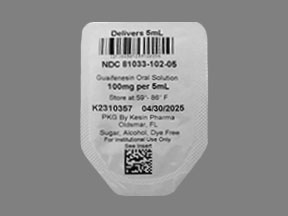
Chest Congestion Relief Coupons & Savings Card – Discount Prices from $7.00
Brand for: Guaifenesin
Guaifenesin is used to treat coughs and congestion caused by the common cold, bronchitis, and other breathing illnesses. This product is usually not used for ongoing cough from smoking or long-term breathing problems (such as chronic bronchitis, emphysema) unless directed by your doctor. Guaifenesin is an expectorant. It works by thinning and loosening mucus in the airways, clearing congestion, and making breathing easier. If you are self-treating with this medication, it is important to read the package instructions carefully before you start using this product to be sure it is right for you. Cough-and-cold products have not been shown to be safe or effective in children younger than 6 years. Do not use this product to treat cold symptoms in children younger than 6 years unless specifically directed by the doctor. Some products (such as long-acting tablets/capsules) are not recommended for use in children younger than 12 years. Ask your doctor or pharmacist for more details about using your product safely. These products do not cure or shorten the length of the common cold. To decrease the risk for side effects, carefully follow all dosage directions. Do not give other cough-and-cold medication that might contain the same or similar ingredients . Ask the doctor or pharmacist about other ways to relieve cough and cold symptoms (such as drinking enough fluids, using a humidifier or saline nose drops/spray).
Our Chest Congestion Relief coupons are free to use. You can print the coupon, email it to yourself, or receive the Chest Congestion Relief coupon via text message. To get your free discount, show the pharmacist your Chest Congestion Relief savings card which has the discounted coupon price. Use our filters below to edit the prescription box to match your needs. The Chest Congestion Relief prices will update based on your prescription needs. Above our Chest Congestion Relief coupons, you can change the location to see pharmacy prices in other areas. Our prescription discount card will update online with the specific pharmacy costs associated with your edits. Be sure to text, email, or print the Chest Congestion Relief savings card code that you need after editing the prescription box and location field. Show the discount card to your pharmacist before paying.
My prescription
Edit
118ML of 100MG/5ML, Guaifenesin (1 Bottle)
Select pharmacy

Albertsons
$7.00
COUPON PRICE
Walgreens
$10.44
COUPON PRICEChest Congestion Relief savings card
Show this card to your pharmacist
Albertsons
$7.00
BIN
ID
PCN
GRP
011867
LHFCEA893B
HT
LABH001
Powered by
Guaifenesin is used to treat coughs and congestion caused by the common cold, bronchitis, and other breathing illnesses. This product is usually not used for ongoing cough from smoking or long-term breathing problems (such as chronic bronchitis, emphysema) unless directed by your doctor. Guaifenesin is an expectorant. It works by thinning and loosening mucus in the airways, clearing congestion, and making breathing easier. If you are self-treating with this medication, it is important to read the package instructions carefully before you start using this product to be sure it is right for you. Cough-and-cold products have not been shown to be safe or effective in children younger than 6 years. Do not use this product to treat cold symptoms in children younger than 6 years unless specifically directed by the doctor. Some products (such as long-acting tablets/capsules) are not recommended for use in children younger than 12 years. Ask your doctor or pharmacist for more details about using your product safely. These products do not cure or shorten the length of the common cold. To decrease the risk for side effects, carefully follow all dosage directions. Do not give other cough-and-cold medication that might contain the same or similar ingredients . Ask the doctor or pharmacist about other ways to relieve cough and cold symptoms (such as drinking enough fluids, using a humidifier or saline nose drops/spray).
Our Chest Congestion Relief coupons are free to use. You can print the coupon, email it to yourself, or receive the Chest Congestion Relief coupon via text message. To get your free discount, show the pharmacist your Chest Congestion Relief savings card which has the discounted coupon price. Use our filters below to edit the prescription box to match your needs. The Chest Congestion Relief prices will update based on your prescription needs. Above our Chest Congestion Relief coupons, you can change the location to see pharmacy prices in other areas. Our prescription discount card will update online with the specific pharmacy costs associated with your edits. Be sure to text, email, or print the Chest Congestion Relief savings card code that you need after editing the prescription box and location field. Show the discount card to your pharmacist before paying.
Our Chest Congestion Relief coupons are free to use. You can print the coupon, email it to yourself, or receive the Chest Congestion Relief coupon via text message. To get your free discount, show the pharmacist your Chest Congestion Relief savings card which has the discounted coupon price. Use our filters below to edit the prescription box to match your needs. The Chest Congestion Relief prices will update based on your prescription needs. Above our Chest Congestion Relief coupons, you can change the location to see pharmacy prices in other areas. Our prescription discount card will update online with the specific pharmacy costs associated with your edits. Be sure to text, email, or print the Chest Congestion Relief savings card code that you need after editing the prescription box and location field. Show the discount card to your pharmacist before paying.
Chest Congestion Relief FAQs
Using the SaveHealth discount card, what is the price of Chest Congestion Relief without insurance?
Using the SaveHealth discount card, the price of Chest Congestion Relief without insurance is $7.00.
What is the price of Chest Congestion Relief at Walgreens?
The price of Chest Congestion Relief at Walgreens is $10.44.
